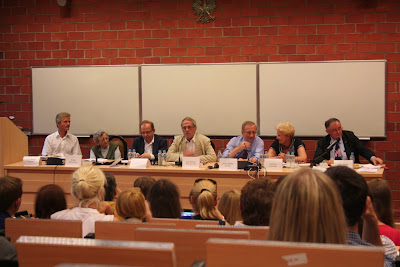On Wednesday, June 8 Humanity in Action Fellows had a great pleasure in participating in a conference organized by the Helsinki Foundation for Human Rights and the Faculty of Law and Administration of the Warsaw University. Which aspects of human rights issues were taken into account during the second part of the event?
 The third panel entitled "Social Rights and People's Needs" was of special value for me because of several very meaningful to me speakers so I anticipated it the most. The list of panelists included among others: ethicist, philosopher and one of the most influential Polish feminists, prof. Magdalena Środa, the President of the Board of Helsinki Foundation for Human Rights Mrs. Halina Bortnowska and, naturally, the commentator of every session prof. Wiktor Osiatyński, with no doubt the most important guest that day. Unfortunately, some of them, including prof. Środa, who I was so glad to see on the program, could not come to the conference.
The third panel entitled "Social Rights and People's Needs" was of special value for me because of several very meaningful to me speakers so I anticipated it the most. The list of panelists included among others: ethicist, philosopher and one of the most influential Polish feminists, prof. Magdalena Środa, the President of the Board of Helsinki Foundation for Human Rights Mrs. Halina Bortnowska and, naturally, the commentator of every session prof. Wiktor Osiatyński, with no doubt the most important guest that day. Unfortunately, some of them, including prof. Środa, who I was so glad to see on the program, could not come to the conference. This panel covered the problematic status of inequality in modern capitalist societies and the unfair way in which social goods are distributed, because they predominantly support the middle class interests and give more to the loudest groups, not the poorest and in the biggest need. The session focused on legal notions which, I guess, might cause lots of difficulties for people unfamiliar with the terminology. Nevertheless, I found it very interesting, especially Dr Elżbieta Morawska's lecture. She reread the content of European Convention of Human Rights, which was signed in 1950, in order to make them usable in interpreting today's cases from the perspective of social rights. She implied from personal laws, mainly ones about prohibition of inhumane treatment - which is commonly interpreted to include torture - the social aspects, which were not previously included into them, and she has also provided examples from the European Court of Human Rights' jurisprudence that such interpretation is also shared by the judges. In my opinion it shows the possibility/a chance to use law which created many years ago in a different political and economic situation to fit today's needs and with current awareness of human rights issues in many dimensions of life (including domestic violence or disabled and mentally ill people's right to dignity). It is also about how to overcome apparent limits of law and use it not literally, but with left-wing sensitivity and responsibility for human beings.
 When it comes to the last session, "Universalism and other Values - are Human Rights Universal Key to Happiness?" there is a lot one can say about. What it was mostly taken into account is the paradoxical character of human rights - with their local genesis and aspiration to global validity. One the one hand, one can be the sign of ethnocentrism and neocolonialism. As one of the speakers Prof. Roman Kuźniar claimed, they are proclaimed with the awareness of hypocrisy itself and used as a tool to legitimize even cruel military interventions. On the other hand speakers define universal values as the core of human rights, which can be applied into other, non-Western cultures with high respect for differences on the level of practice. In this way, as prof. Zdzisław Kędzia admitted, human rights guarantee diversity rather than uniformity. Probably only one speaker directly answered the topic question. "Human rights are not the key to happiness, they are just key to sensibility", Halina Bortnowska said in her brief but moving speech.
When it comes to the last session, "Universalism and other Values - are Human Rights Universal Key to Happiness?" there is a lot one can say about. What it was mostly taken into account is the paradoxical character of human rights - with their local genesis and aspiration to global validity. One the one hand, one can be the sign of ethnocentrism and neocolonialism. As one of the speakers Prof. Roman Kuźniar claimed, they are proclaimed with the awareness of hypocrisy itself and used as a tool to legitimize even cruel military interventions. On the other hand speakers define universal values as the core of human rights, which can be applied into other, non-Western cultures with high respect for differences on the level of practice. In this way, as prof. Zdzisław Kędzia admitted, human rights guarantee diversity rather than uniformity. Probably only one speaker directly answered the topic question. "Human rights are not the key to happiness, they are just key to sensibility", Halina Bortnowska said in her brief but moving speech.The meeting was heading to its end, when prof. Mirosław Wyrzykowski made an unexpected gesture toward Humanity in Action in his closing speech. As he said, a relevant subtitle of this year's conference should contain the name of our organization "Human Rights and their Limits - Humanity in Action" and that thanks to us the conference gained an international status. We are grateful for appreciating us, it was a great pleasure to take part in such an crucial event. Our first and for sure not the last visit to the Helsinki Foundation of Human Rights Conference brought us a very good experience and gave us a lot food for thought for the future.